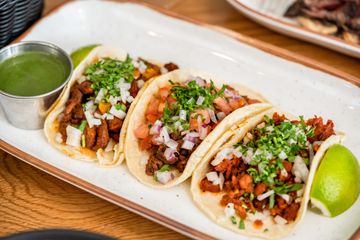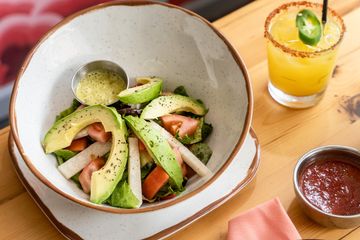Learn why mexican food remains a timeless cuisine among travelers
Wiki Article
Is Mexican Food Healthy? Unpacking the Nutritional Advantages of Typical Ingredients
The inquiry of whether Mexican food is healthy welcomes an exploration of its standard active ingredients. Beans and corn work as foundational staples, abundant in protein and fiber. Avocados give advantageous fats, while numerous herbs and flavors include taste and health advantages - mexican food. Together, these elements create a tapestry of nutrition. The healthiness of Mexican food often depends on prep work methods and part sizes. What duty do these elements play in determining its general nutritional value?The Power of Beans: Protein and Fiber-Rich Staples
Although usually overlooked, beans work as a keystone of Mexican food, offering a wide range of nutritional advantages. Rich in protein, they are an exceptional plant-based option for those seeking to meet their dietary healthy protein requires. This high healthy protein material supports muscular tissue fixing and development, making beans invaluable for both vegetarians and meat-eaters alike. In addition, beans are an extraordinary source of dietary fiber, which aids in food digestion and promotes a feeling of volume, possibly assisting with weight management.The selection of beans utilized in Mexican meals, such as black beans, pinto beans, and kidney beans, adds to a varied taste profile and can boost dishes nutritionally. Beans are low in fat and contain essential vitamins and minerals, including iron, folate, and magnesium. Together, these qualities make beans an important ingredient, providing both nutrients and nourishment in conventional Mexican price.

Corn: a Versatile Grain With Nutritional Perks
Corn stands out as a flexible grain essential to Mexican cuisine, celebrated not only for its culinary applications yet also for its excellent nutritional account. As a main component in dishes like tortillas, tamales, and pozole, corn gives crucial nutrients that add to a well balanced diet. Rich in carbs, it serves as a significant energy source, while additionally being low in fat, making it a beneficial choice for different nutritional needs.Additionally, corn is a good resource of dietary fiber, which aids in food digestion and promotes satiation. It includes significant quantities of vitamins such as B-complex vitamins, which are crucial for basal metabolism. The presence of anti-oxidants, particularly carotenoids, adds to overall health by decreasing oxidative tension. Furthermore, corn is gluten-free, accommodating those with gluten sensitivities. On the whole, the dietary benefits of corn emphasize its relevance in conventional Mexican food and its role in a healthy and balanced diet regimen.
Avocados: Healthy Fats and Nutrients in Every Bite
Avocados play a substantial role in Mexican food, complementing dishes with their luscious appearance and rich flavor. Past their culinary allure, avocados are celebrated for their excellent dietary account. They are an abundant resource of healthy monounsaturated fats, which can aid lower bad cholesterol degrees and assistance heart health. Furthermore, avocados are loaded with important minerals and vitamins, including potassium, vitamin E, and B vitamins, adding to overall wellness.The high fiber content in avocados help food digestion and promotes satiety, making them a beneficial addition to any kind of meal. Their distinct nutrient structure can also support skin health and wellness and give anti-inflammatory benefits. Integrating avocados right into conventional Mexican recipes or appreciating them as a standalone treat can boost both flavor and nourishment, demonstrating why they are a precious staple in Mexican cuisine. Generally, avocados offer a scrumptious method to delight in healthy fats and important nutrients in every bite.

Herbs and spices: Flavorful Wellness Boosters
While appreciating the rich tastes of Mexican cuisine, one can not overlook the necessary duty that spices and herbs play in boosting both taste and health. Active ingredients such as oregano, cilantro, and chili peppers not only add to the vivid taste account yet also provide substantial health and wellness benefits. For circumstances, cilantro is understood for its detoxifying homes, helping to eliminate hefty steels from the body, while oregano is packed with anti-oxidants and has anti-inflammatory results.Chili peppers, a staple in numerous Mexican dishes, have capsaicin, which has been connected to improved metabolic rate and discomfort relief. Additionally, flavors like cumin and coriander support food digestion and might aid in blood glucose policy. Integrating these tasty wellness boosters into dishes not only boosts the cooking experience but also promotes overall health, making Mexican food not just tasty, however likewise nutritionally useful.
Typical Cooking Methods: Enhancing Nutrition and Flavor
Typical food preparation approaches in Mexican cuisine play a necessary duty in boosting both nutrition and flavor, as they frequently prioritize classic strategies and fresh ingredients. Techniques such as nixtamalization, where corn is saturated and prepared in an alkaline service, not only improve the nutrient account of tortillas but also improve their digestibility - freshly made guacamole. In addition, making use of sluggish food preparation approaches, like stewing or braising, enables tastes to meld beautifully while preserving the honesty of the active ingredients
Regularly Asked Inquiries
Are Mexican Food Portions Typically Larger Than Other Foods?
Mexican food portions are commonly bigger than those of numerous other foods. This particular reflects standard eating methods, stressing communal sharing and hearty dishes, which can bring about an extra significant offering size generally.
Just how Does the Prep Work Method Affect Healthiness of Mexican Food?
Preparation approaches considerably influence the healthiness of Mexican food. Methods such as barbecuing or steaming preserve nutrients, while frying can increase harmful fat content. Choices of active ingredients and cooking styles eventually figure out overall nutritional value.Can Mexican Food Be Tailored for Specific Nutritional Limitations?
Mexican food can indeed be tailored for particular dietary restrictions. Substitutions, such as utilizing corn tortillas for gluten-free diet plans or integrating more vegetables, make it possible for people to delight in conventional tastes while accommodating various nutritional requirements.What Are Usual Misunderstandings Regarding Mexican Food and Health And Wellness?
Usual false impressions concerning Mexican food include the idea that it is naturally undesirable, excessively hot, and solely concentrated on fats. In reality, conventional dishes frequently feature nourishing active ingredients and can be tailored to numerous dietary demands.Are There Much Healthier Options at Mexican Restaurants?
Much healthier choices at Mexican dining establishments frequently include smoked meats, beans, and fresh veggies. Selecting meals that highlight entire ingredients and staying clear of hefty sauces can lead to a much more nourishing eating experience, advertising total well-being.The variety of beans utilized in Mexican dishes, such as black beans, pinto beans, and kidney beans, adds to a diverse flavor profile and can enhance meals nutritionally. Avocados play a considerable duty in Mexican cuisine, matching meals with their creamy structure and abundant flavor. Incorporating avocados right into typical Mexican recipes or enjoying them as a standalone snack can improve both flavor and nutrition, demonstrating why they are a beloved staple in Mexican cuisine. While taking pleasure in the abundant flavors of Mexican cuisine, one can not overlook the crucial function that spices and herbs play in improving both taste and health and wellness. Standard cooking approaches in Mexican food play an essential duty in boosting both nourishment and flavor, as they often prioritize fresh components and time-honored methods.
Report this wiki page